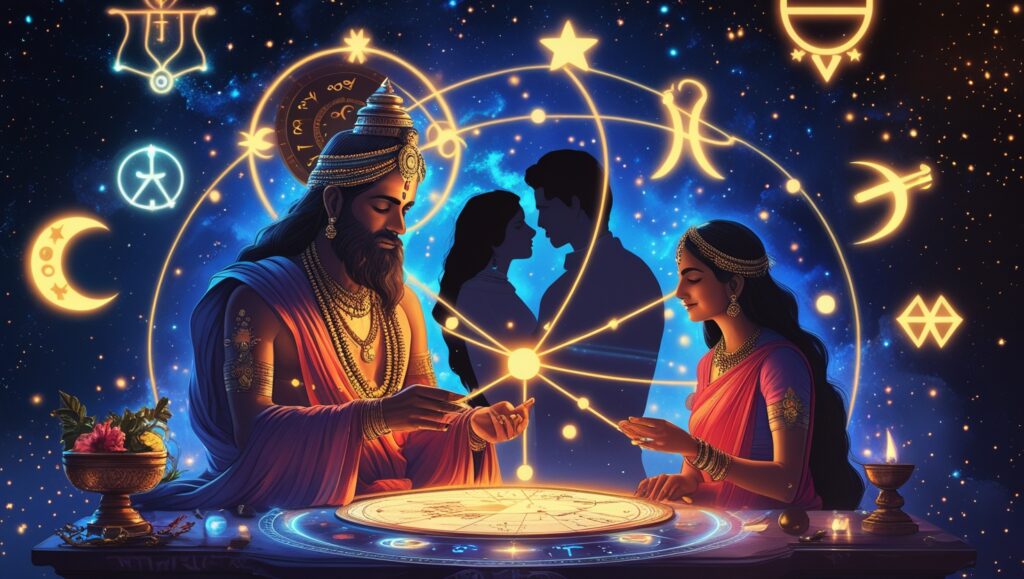Table of Contents
In Vedic astrology, Gunanka (गुणांक) is a significant metric used to assess the compatibility between two individuals, especially for marriage. This system is rooted in the Ashtakoota method — an eight-fold analysis that evaluates various aspects of a couple’s relationship, from emotional bonding to physical attraction and even long-term well-being. Let’s explore this fascinating system in detail and understand how it’s applied in modern astrology.
The Foundation: Ashtakoota System
The word Ashtakoota is derived from “Ashta” (eight) and “Koota” (categories). This method divides compatibility into eight critical aspects, each assigned a specific score. The total score sums up to 36 points — the Gunanka. A higher score indicates better harmony and understanding between partners.
Here’s a detailed breakdown of the eight Kootas:
- Varna (1 point) — Represents the spiritual and social compatibility of the couple. It compares the nature and ego levels of both partners, aligning them based on four Varnas: Brahmin (intellectual), Kshatriya (warrior), Vaishya (merchant), and Shudra (worker).
- Vashya (2 points) — Reflects control and mutual influence. It assesses which partner is more dominant and whether this dynamic will create harmony or conflict.
- Tara (3 points) — Measures the health and well-being compatibility, ensuring the relationship supports each other’s physical and mental health.
- Yoni (4 points) — Evaluates sexual compatibility and intimacy, categorized by animal symbols representing different personality traits and behaviors.
- Graha Maitri (5 points) — Determines mental and intellectual compatibility, focusing on how well the couple understands and communicates with each other.
- Gana (6 points) — Classifies personalities into three types: Deva (divine), Manushya (human), and Rakshasa (demonic). It assesses temperament and emotional compatibility.
- Bhakoot (7 points) — A critical factor influencing financial stability, career support, and family welfare. It reflects the emotional connection and overall well-being of the couple.
- Nadi (8 points) — The most significant factor, representing genetic compatibility and health. It helps prevent potential hereditary issues in offspring.
Interpreting the Gunanka Score
The total Gunanka score is the sum of the points from all eight Kootas. The interpretation of the score is as follows:
- 0 to 18 points: Low compatibility — traditionally considered unsuitable for marriage.
- 19 to 24 points: Average compatibility — workable with understanding and effort.
- 25 to 32 points: Good compatibility — supportive and harmonious relationship.
- 33 to 36 points: Excellent match — highly compatible on all levels.
How Gunanka is Used in Modern Vedic Astrology
In modern times, Vedic astrologers continue to use the Gunanka system, but with a more flexible approach. While the numeric score is still a guiding factor, astrologers now emphasize understanding the nuances behind each Koota.
For example:
- Emotional Intelligence: Even if the Bhakoot score is low, an astrologer may consider the couple’s emotional maturity and communication styles.
- Cultural Compatibility: Modern astrologers blend traditional methods with practical insights, accounting for cultural backgrounds, lifestyle choices, and personal values.
- Remedies: If the score is low, remedies like chanting specific mantras, performing pujas, or wearing gemstones are often suggested to balance the energies.
Beyond the Numbers: A Holistic View
While Gunanka provides a structured way to evaluate compatibility, it’s essential to remember that successful relationships require more than just a favorable horoscope. Factors like mutual respect, love, and emotional intelligence play a huge role.
Many modern astrologers use Gunanka as one part of a more comprehensive analysis, combining it with Dasha compatibility (planetary periods) and Navamsa charts (a specialized divisional chart for marriage).
Final Thoughts
The Gunanka system remains a powerful tool in Vedic astrology, offering insights into the dynamics of a relationship. It’s a blend of science, tradition, and spiritual wisdom — guiding individuals toward more harmonious partnerships. However, while it’s valuable to consult astrology for compatibility, the true strength of a relationship ultimately lies in the couple’s ability to nurture love, understanding, and resilience.
Would you like to explore your Gunanka score or dive deeper into your personal astrological chart? Reach out to a trusted Vedic astrologer and embark on the journey of self-discovery and relationship harmony.

